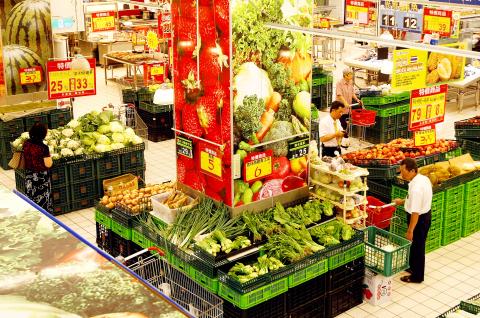The Taiwan Institute of Economic Research (TIER, 台灣經濟研究院) yesterday cut its GDP growth forecast for the nation this year from the 3.96 percent it forecast in January to 3.48 percent, citing weaker-than--expected growth in the first quarter.
The government’s decision to raise gasoline and diesel prices this month, as well as increase electricity rates next month, also made the institute raise its growth forecast for inflation to 1.98 percent, up 0.52 percentage points from the January forecast of 1.46 percent.
The Taipei-based think tank’s latest forecast for economic growth was the lowest among all domestic economic research institutes and its growth forecast for inflation is the highest.

Photo: CNA
“Although the global economy has been resurging in the first quarter, the momentum was weaker than expected, leading us to revise down the full-year GDP growth forecast for Taiwan,” Gordon Sun (孫明德), deputy director of the institute’s macroeconomic forecasting center, told a press conference.
The institute revised downward its forecast for first-quarter economic expansion to 0.98 percent, from the 2.78 percent estimated previously, citing lower-than-expected exports and investments during the January-to-March period.
For the remaining quarters of this year, GDP is expected to grow 2.04 percent year-on-year in the second quarter, 4.57 percent in the third quarter and 6.07 percent in the final quarter, the institute said in a report.
Rising uncertainties about consumer prices, led by the looming rise in energy prices, also made the institute cut its growth forecast, Sun said.
Other than affecting economic growth and raising inflationary pressure, the hike in energy prices might further slow private consumption momentum, TIER president David Hong (洪德生) said.
The institute cut its forecast for full-year growth of private consumption to 2.51 percent, down 0.45 percentage points from its previous estimate.
The institute forecast the nation’s output to grow 2.11 percent this year, and input to fall 1.49 percent from a year earlier, the report said. It also forecast private investment to rise 0.66 percent this year.
Separately, a TIER survey showed business climate indicators for the manufacturing and -service sectors last month rebounded for the third consecutive month, indicating business sentiment continued to recover.
However, only 32.8 percent of the respondents expected business to pick up in the next six months, a sharp decline from the 45.7 percent recorded in a survey conducted in February.
The new survey confirmed that the recovery of the global economy made manufacturers feel more optimistic last month, Hong said.
However, uncertainties ,-including the return of the eurozone’s debt crisis and rising operating costs led by inflation, made them keep a relatively cautious outlook on the near future, Hong added.

SEMICONDUCTORS: The German laser and plasma generator company will expand its local services as its specialized offerings support Taiwan’s semiconductor industries Trumpf SE + Co KG, a global leader in supplying laser technology and plasma generators used in chip production, is expanding its investments in Taiwan in an effort to deeply integrate into the global semiconductor supply chain in the pursuit of growth. The company, headquartered in Ditzingen, Germany, has invested significantly in a newly inaugurated regional technical center for plasma generators in Taoyuan, its latest expansion in Taiwan after being engaged in various industries for more than 25 years. The center, the first of its kind Trumpf built outside Germany, aims to serve customers from Taiwan, Japan, Southeast Asia and South Korea,

Gasoline and diesel prices at domestic fuel stations are to fall NT$0.2 per liter this week, down for a second consecutive week, CPC Corp, Taiwan (台灣中油) and Formosa Petrochemical Corp (台塑石化) announced yesterday. Effective today, gasoline prices at CPC and Formosa stations are to drop to NT$26.4, NT$27.9 and NT$29.9 per liter for 92, 95 and 98-octane unleaded gasoline respectively, the companies said in separate statements. The price of premium diesel is to fall to NT$24.8 per liter at CPC stations and NT$24.6 at Formosa pumps, they said. The price adjustments came even as international crude oil prices rose last week, as traders

Taiwan Semiconductor Manufacturing Co (TSMC, 台積電), which supplies advanced chips to Nvidia Corp and Apple Inc, yesterday reported NT$1.046 trillion (US$33.1 billion) in revenue for last quarter, driven by constantly strong demand for artificial intelligence (AI) chips, falling in the upper end of its forecast. Based on TSMC’s financial guidance, revenue would expand about 22 percent sequentially to the range from US$32.2 billion to US$33.4 billion during the final quarter of 2024, it told investors in October last year. Last year in total, revenue jumped 31.61 percent to NT$3.81 trillion, compared with NT$2.89 trillion generated in the year before, according to

SIZE MATTERS: TSMC started phasing out 8-inch wafer production last year, while Samsung is more aggressively retiring 8-inch capacity, TrendForce said Chipmakers are expected to raise prices of 8-inch wafers by up to 20 percent this year on concern over supply constraints as major contract chipmakers Taiwan Semiconductor Manufacturing Co (TSMC, 台積電) and Samsung Electronics Co gradually retire less advanced wafer capacity, TrendForce Corp (集邦科技) said yesterday. It is the first significant across-the-board price hike since a global semiconductor correction in 2023, the Taipei-based market researcher said in a report. Global 8-inch wafer capacity slid 0.3 percent year-on-year last year, although 8-inch wafer prices still hovered at relatively stable levels throughout the year, TrendForce said. The downward trend is expected to continue this year,